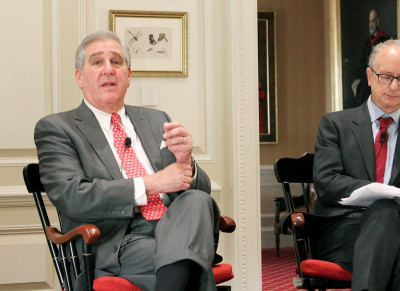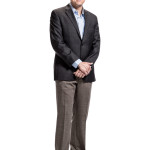
With a single glance at Boston University’s expansive calendar of events, one can be sure to find a seminar given by speakers, ranging from social advocates to CEOs to politicians. Professors are taking advantage of these ample resources in encouraging students to attend outside lectures to learn from professionals who have a career’s worth of experience.
Katherine Levine Einstein, a professor in BU’s College of Arts and Sciences, specializes in urban politics and public policy. Einstein jumped on the opportunity to supplement her lecture material with outside seminars and lectures. She teaches “The Politics and Policy of HBO’s ‘The Wire,’” a class in which students combine a study of the television show “The Wire“ with the study of political science, economics and sociology.
So, when BU’s Initiative on Cities announced it would be hosting a seminar by Jerry Abramson, Einstein was thrilled. The deputy assistant to the president and White House director of intergovernmental affairs shared his understanding of how cities can often influence national policy.
“Specifically with Jerry Abramson, it’s a really exciting opportunity to see class themes applied in the real world,” she said.
Einstein said she hopes hearing a professional in the field will encourage students to recall what they learned in class and apply that knowledge when they are pursuing a career in the same field.
David Glick, an assistant professor to Einstein who also teaches the political science course, was enthusiastic about the opportunity for students to hear such an experienced politician speak.
“[This lecture] was a natural fit for encouraging students to go,” he said. “If you hear the same messages from professors and someone outside of class, it reinforces it.”
Glick noted that while material covered in class offers a general analysis of themes and theories, outside lectures provide a more specific “case study.”
In addition to politicians like Jerry Abramson, BU attracts a plethora of other professionals whose experiences offer an enriching supplement to class material.
Tammy Vigil, a professor in the College of Communication, said she always urges students to get out of the classroom and attend the lectures BU hosts. Additionally, she said she uses Twitter to tell students about interesting seminars available to them.
“In most courses you have the same person giving their perspective over and over,” Vigil said. “So to go to these lectures, it’s really nice to see somebody else’s perspective and to think about something in a deeper manner.”
Vigil teaches an intro-level course that gives new COM students an overview of all the areas within communication. She said the speakers she recommends to her students provide more specific insight to each of these areas, which is helpful for students who are uncertain of their career options or the type of field they want to pursue.
Attending outside lectures not only provides students with informative content, but also sets students up for good habits. Vigil said that when students begin attending co-curricular activities early in their studies, they tend to take more away from their educational experience.
“It sets good habits for them that will continue throughout college, but will also continue throughout life where they will actually seek out these kinds of opportunities in their communities,” Vigil said.
Professors are not the only ones who look forward to supplemental class material. Students seem to enjoy the fresh perspectives too.
Tigran Melkonian, a sophomore in CAS, said his Chinese professors frequently recommend that students attend Chinese cultural events on campus, which he said “supplements and adds to class” and enhances his education with “mostly cultural knowledge.”
Regardless of department, BU provides an eclectic mix of speakers that can supplement any class.
“It’s great to just have an outside perspective because usually it’s just your professors giving you feedback on your work,” Adrienne Reid, a senior in the College of Fine Arts said.
Reid, a painter, said she enjoys the opportunity to converse with professional artists who are doing what students hope to someday do.
“These are important artists, so it’s nice to hear their story and where they came from and how they became successful,” she said.
Kaitlyn Locke contributed reporting.














